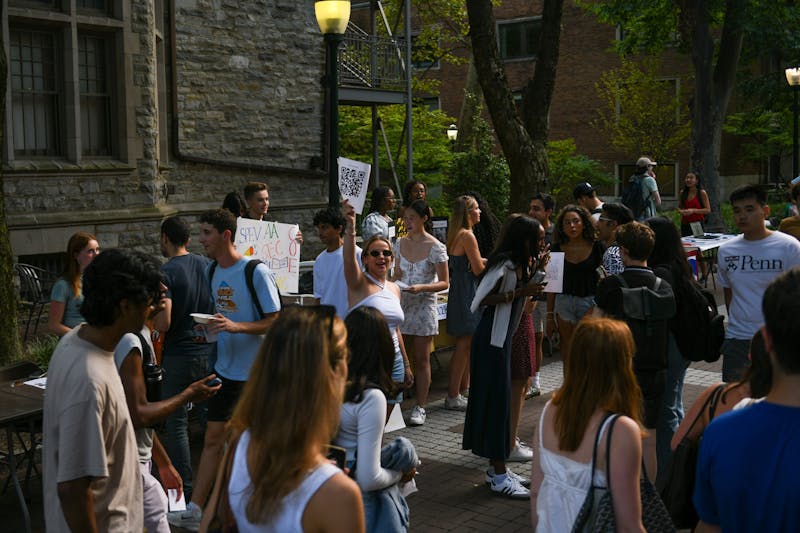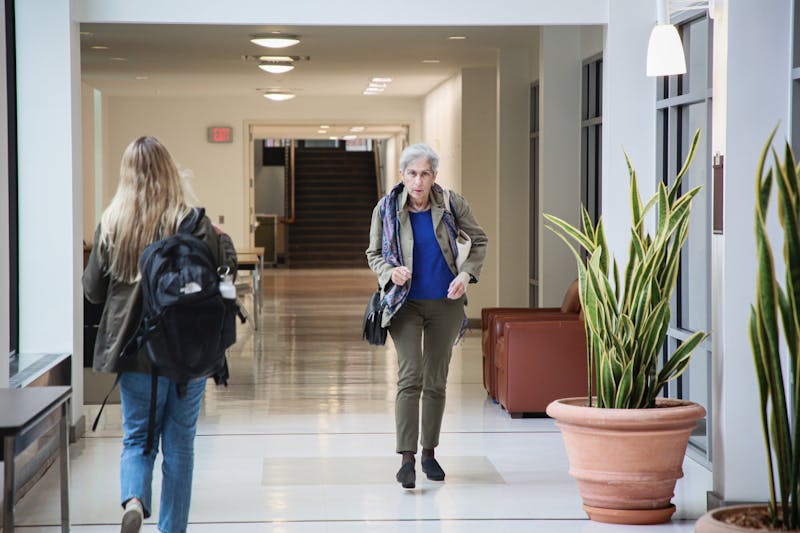For those rape victims that come forward and prosecute to ensure the rapist will not hurt any other people, the process can, at times, be grueling. And although many perceptions about the difficulty of the process are right, others may be exaggerated. For any rape victim, reporting the rape to police, counselors and hospital personnel can be like reliving the attack again and again. In addition, embarrassment and discomfort during the physical examination is a lot to bear for anyone who has been victimized. In the court hearings, the victim may be humiliated and blamed for the rape by the defense attorney. Throughout the long process, patience sometimes becomes more than a virtue. But many of the believed faults in the system are not always true. At the University, special police officers can be supportive and comforting, not rude. Their policy is to not blame the victim, but rather to support the victim throughout the whole process. The victim is never alone, as many sometimes think. · Although, victims who want to prosecute should seek help and a medical exam immediately, many survivors of acquaintance rape wait about three days before reporting the incident, according to Ruth Wells, of Victim Support and Special Services. After three days, most victims realize they cannot cope and want to do something about the crime. "They want to make sure the same person doesn't do it to someone else," Wells said. Sometimes the victim will first tell a friend, a resident advisor or even a professor. Wells said there have been two incidents in which students went to professors for help. Victim Support and Special Services is a department within the University Police Department established to support victims of all crimes, ranging from bicycle theft to rape, and to facilitate crime prevention. If the victim reports the acquaintance rape to the University Police they will be directly guided to Victim Support. In addition, if the victim goes to a hospital first, Wells and one of her specially-trained officers, who are on call 24 hours a day, will meet the victim at the hospital. The victim can request a female officer if she wishes. The victim can also come directly to Victim Support, a red brick building located behind the University Police Station, which is across from High Rise North. According to Wells, when an acquaintance rape victim walks into her office, Wells first assures her that acquaintance rape does happen and tells her she and Victim Support are here to help. Next, Wells asks the victim if she wants to talk about the incident and reminds her she is always in control of the situation and can do whatever she feels comfortable doing. Wells then tells the victim of her options for counseling, medical treatment and prosecution. In addition, Wells asks if she can take notes. "If I take notes, I don't ask for detailed information," Wells said. "I just establish if we are talking about the same thing." She then explains the legal definition of rape which is any degree of penetration of the penis into the vagina against the woman's will. "If the victim isn't sure if she has been raped, I tell her the law doesn't require her to scream or struggle for it to be rape," Wells said. "If it is against your will, it is rape." Wells said Victim Support makes sure the victim's needs are taken care of first. They arrange for a medical exam and advise all victims to have counseling. Wells said she sees 20 to 25 acquaintance rape victims per semester. If the victim decides to report the crime to the police, a plainclothes officer will take a report from the victim at Victim Support. The report takes about 15 minutes to complete, and the victim does not have to go to the University Police station. Even if the victim is not sure whether to report the crime to the police, the information given to Wells can later be used if the victim decides to prosecute. According to Wells, the more information the victim initially gives, the better. Many times, victims block out details about the rape and are unable to clearly recall what happened weeks later. Usually, the victim's mind is more clear shortly after the rape. If the victim does not file a police report, the information will stay confidential in the Victim Support office until the victim decides to file charges. If the victim prefers, the only fact reported to the University is that a rape did occur and no facts about the rape itself. The woman has 7 years after the rape is committed to press charges under Pennsylvania law. Each victim spends different amounts of time at Victim Support, depending on what course of action they want to take and how much they want to talk about the incident. Victim Support also has a residential system that will move the victim to new housing if desired. From Victim Support, the woman is usually taken for medical attention. The police officer will take the victim to a hospital or wherever she prefers to go. If the woman is not calling the incident rape but only says she was forced to have sex against her will, she can go to Student Health or the Hospital of the University of Pennsylvania. But when the victim says she has been raped, she has to go to Jefferson Hospital, located at 10th and Walnut Streets, for an examination. All rape victims in the city of Philadelphia are examined at Jefferson Hospital. Doctors and nurses at the crisis center at Jefferson are specially trained to treat victims of sexual assault. The officer does not take the victim to the hospital in a police car. Instead, the victim is taken in an unmarked Oldsmobile. A regular car is used, and officers are not in uniform in order to make the victim feel comfortable and not to draw attention to the victim. According to Victim Support Officer Anne Marie Lepone, who has accompanied victims through the medical and legal systems, she tries to make the 10 minute drive to the hospital as pleasant as possible for the victim. "I keep assuring the victim she is strong and will get through it," Lepone said. "I ask if she is comfortable or if she wants anything to drink or eat." Once at the hospital, the victim is taken to the crisis center, where the victim may remain for up to three hours. According to Lepone, how long the victim waits depends on how many patients are waiting in the crisis center. Sometimes the patient can be examined immediately, and other times she has to wait. The victim may request to have a friend brought to the hospital, and Victim Support will bring that person there. After the patient has arrived, Jefferson Hospital reports the acquaintance rape to the Sex Crimes Division of the Philadelphia Police Department, which will then send an officer to the hospital if one is available. Once someone from Sex Crimes arrives, the officer will ask the victim for details of what happened during the acquaintance rape. But Lepone said she tries to avoid making the victim relive the crime if possible. She may wait and take the University Police report at the same time as Sex Crimes is taking down their information instead of taking the report at Victim Support. "We ask the victim to describe what happened in her own words and then we ask them questions," Sex Crimes Lieutenant William Broadbent said. Once the victim has given a report to Sex Crimes, she will not have any contact with the Sex Crimes division again until the investigator appears in court. But sometimes, a follow-up interview is needed. According to Broadbent, the officers from Sex Crimes are all trained to be sensitive to victims, and also do not wear uniforms. If an officer from Sex Crimes is not available, the victim will have to go to the the Sex Crimes unit at 1700 Pattison Avenue, near the Spectrum. The Victim Support officer will drive the victim to the Sex Crimes Building if necessary. The drive from Jefferson Hospital to Sex Crimes lasts about 20 minutes, and the Sex Crimes headquarters is an old, red brick building. According to Jefferson crisis center nurse Deborah White, she or another nurse will talk to the victims brought to the hospital about what happened and what orafices were penetrated, determine what information the hospital needs for the police and determine what type of injuries the victim has suffered. The nurse will then call Women Organized Against Rape, who will send a counselor to the hospital for the victim. The victim is asked to sign a consent form authorizing the examination and the release of information to the police. Then the victim is asked to change her clothes, and the exam begins. All evidence is placed in a Johnson Rape Kit, a small box which holds all evidence gathered during the examination, which is later taken by the police to be used as evidence in case of a trial. Blood is drawn from the victim in order to test for syphilis. Another vial of blood is taken to test for the victim's blood type. A saliva sample is also taken. During the preliminary examination, the officer from Victim Support stays with the victim. The officer leaves once the pelvic examination begins. During this part of the examination done by a doctor, long-stemmed Q-tips are used to take cultures and smears, which include the rapist's blood and semen. In addition, all victims are tested for gonorrhea, and the pubic hairs may be combed for evidence. Any orafice which has been penetrated, vaginal, oral or rectal, is examined for injuries and evidence. In addition, the nurse will collect any clothing that may be evidence. According to White, this may include underpants put on after the attack and anything with blood or tears on it. The victim is also given a chance to take a "morning after" pill, to prevent an unwanted pregnancy. The pill is a concentrated birth control substance that often has side effects, like nausea. They are also sometimes given antibiotics. The victim may then wash and get dressed. The examination for a rape victim is free of charge. A WOAR counselor will arrive at the hospital within 30 minutes of notification from the nurse. According to WOAR Executive Director Vanessa Grant-Jackson, the WOAR counselor will also explain all the victim's options, offer counseling and support and offer to accompany the victim through the judicial system. Grant-Jackson said many students feel more comfortable talking to staff from WOAR rather than talking to counselors from the University. WOAR is totally confidential and removed from the University. In addition, WOAR specializes in sexual asault needs, unlike Victim Support, which helps victims of all crimes. Victims can also visit WOAR at 1233 Locust Street. The building is modern and comfortable with mirrors on the walls. The WOAR office is on the second floor in suite 202.
The Daily Pennsylvanian is an independent, student-run newspaper. Please consider making a donation to support the coverage that shapes the University. Your generosity ensures a future of strong journalism at Penn.
DonatePlease note All comments are eligible for publication in The Daily Pennsylvanian.







